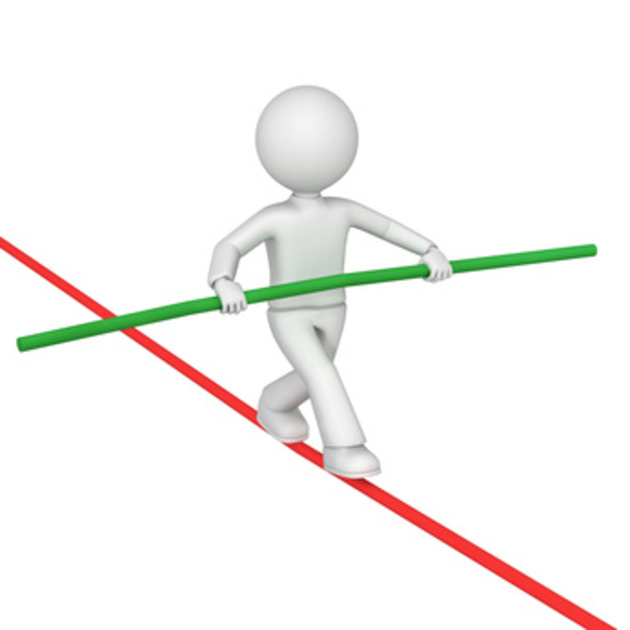
Dilemmas – Parshat Pinchas
Sometimes I just hate dilemmas. They force me to choose between different options. And some of them aren’t so pleasant. You must have heard of the phrase 'between a rock and a hard place'. Some options are really unpleasant. And when you have two unpleasant options, then you're really going to suffer the choice.
Rashi in this week's parsha, Parshat Pinchas alludes to this. Back when the sun and moon were created, it says that God created "the two large lights" and immediately after, in the same verse, the Torah calls them "the large light" and "the small light".1 Rashi, based on a midrash, explains the discrepancy saying that the two heavenly lights were in fact created the same size. Due, however, to the moon's "declaration" that it doesn’t make sense to have two lights of the same size, God told the moon to make itself smaller. Hence the change in the verse from two large lights to one large and one small.2
"In making the choice, I have condemned all the others and sentenced them to “never being,”
and even this is for all eternity! But it is wonderful to know that the
future—my own future and with it the future of the things,
the people around me—is somehow, albeit to a very small extent,
dependent on my decisions
Frankl
As a follow up to this story, in this week's parsha we read that the sacrifice to be brought on Rosh Chodesh (the new moon marking the beginning of the new lunar month) would include a Korban Chatat, a Sin Offering for God.3 Rashi, being consistent with his commentary earlier, refers again to the same midrash and explains that God asks for a sin offering to be brought for Him because He made the moon smaller.4 Since the moon "suffered" because of that decision, even though He took responsibility for it and thought it was the right thing to do, He asks for a Chatat to be brought for Him. He "feels" for the moon.
We can make the right decision but someone may still suffer. Chazal also note, in the same fashion, that God had the two temples destroyed but didn’t take pleasure in exiling the people of Israel. He suffers from His decision even though He believes it was the right thing to do.
Not only God suffers when making these kinds of decisions.
In the novel "Sophie's Choice", the heroine, Sophie, upon arrival at a concentration camp, was forced to choose which of her two children would live and which would die.5 Is there a "good" choice? If a couple has some money left after all their needs are cared for, do they "splurge" on an extra physical therapy session for their aging parent or a tutor for their kid suffering from ADHD? Or do they do self-care and go out for an evening? How do you make such a decision? How can you?
Or perhaps a medical team with limited staff has to make decisions about which patient to treat first, knowing that some will suffer because of that decision.
Choice, it seems, has more to do with the process than the actual outcome. After all, we can never be sure of the outcome. How many times have you made a choice and then certain details changed which would have affected the actual choice? Even perhaps feeling bad for those negatively affected by the outcome is what the whole choice was about – attuning ourselves to the needs and emotions of others. The choice says more about us and how it sets us apart from the animal kingdom than it does about the decision itself.
As Doctor Viktor Frankl wrote, "In making the choice, I have condemned all the others (other choices) and sentenced them to “never being,” and even this is for all eternity! But it is wonderful to know that the future—my own future and with it the future of the things, the people around me—is somehow, albeit to a very small extent, dependent on my decisions."6 This realization is very scary yet very empowering.
It is the dilemma itself and how we solve it that is part of our being human. Choice, though challenging, is a privilege of our humanness.
Notes
- Bereishit 1:16
- It is clear that this midrash needs to be understood more deeply. And not all the commentaries accept this explanation. Rashbam for instance says that they were in fact both large but that one is larger than the other. Perhaps in another blog we will be able to understand the midrash more in depth.
- Bamidbar 28:15
- Chulin 60b
- Wikipedia has a whole page on this novel https://en.wikipedia.org/wiki/Sophie%27s_Choice_(film)
- Frankl, Viktor E.. Yes to Life (p. 106). Beacon Press. Kindle Edition
Have A Great Shabbat!![]()
For More Information On Logotherapy And How You Can Create A Fuller, More Meaningful Life, Or To Book An Online Session,
- Call Me At +972-54-589-3399, or in Israel 054-5893399
- Contact Me Thru my email at [email protected]

 Previous
Previous

